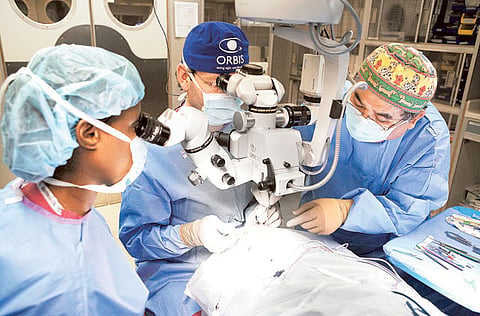Flying eye hospital lands in Abu Dhabi
Hospital has performed 800,000 vision correction surgeries since 1982

Known as the ORBIS Flying Eye Hospital, the initiative involves a planeload of medical staff delivering both surgeries and ophthalmological training. It is operated by ORBIS International, a non-profit humanitarian organisation dedicated to providing eye care and preventing avoidable blindness.
As part of many of its tours to raise awareness and invite partnerships from medical professionals, the unique flying hospital is currently parked at Abu Dhabi’s Al Bateen Executive Airport. Speaking to Gulf News, Dr Ahmed Gomaa, the hospital’s medical director, said 800,000 surgeries have been performed since the initiative was launched in 1982.In numerous cases, blindness and visual impairment can be avoided, especially in cases when it is caused by lack of proper eye care and nutrition in developing cases. In fact, 20 per cent of all our patients have been children who have received eye care to restore their vision,” Dr Gomaa said.
According to the World Health Organisation (WHO), an estimated 39 million people across the world suffer from blindness, and about 246 million people have low vision. Ninety per cent of all visually impaired people, either blind or suffering from low vision, live in developing countries. Yet, 80 per cent of all vision impairment is avoidable or can be cured.
“Eyesight is hard to restore if blindness has persisted for a long time. Otherwise, simple procedures are often all that is needed. ,” the medical director explained.
One of the major causes of blindness is the development of cataracts, a layer that develops over the lens and clouds vision.
“Most cataracts are treatable and the surgery is usually very successful. But without it, people in many developing countries become blind. And if the cataract has existed for a long while, the restoration surgery can be complicated,” Dr Gomaa said.
Other common cases for visual impairment, as reported by the WHO, are refractive errors of the lens in the eye and glaucoma (damage to the optic nerve in the eye).
A range of other ophthalmic surgeries are also conducted by the team, who has visited 90 countries so far including Bangladesh, Ethiopia, Uganda and China. The surgeries are also always free of charge for patients.
Yet, providing free operations is not the flying hospital’s main goal.
“Performing a set of surgeries in each country we visit does not help sustain the level of eye care there. This is why we select surgeries based on level of need of the local population, and we work to train medical staff from local hospitals to perform these procedures,” the doctor said.
In follow-up trips to the same location, we not only check on patients whom we have treated but also work to boost skill transfer with among local doctors,” he added.
To date, more than 300,000 eyecare professionals have been trained by ORBIS Flying Eye Hospital and their volunteers in different countries.
These trips often take years of planning, and ORBIS staff visit each potential location multiple times to ensure that the Ministry of Health and local hospitals are ready to support them in providing eye care to the underprivileged.
“It is a demanding job, and our staff are working all the time, either on a project or to plan the next one. But the miracle moment when a blind patient realises he is able to see is what we all work for,” Dr Gomaa said.
Sign up for the Daily Briefing
Get the latest news and updates straight to your inbox



